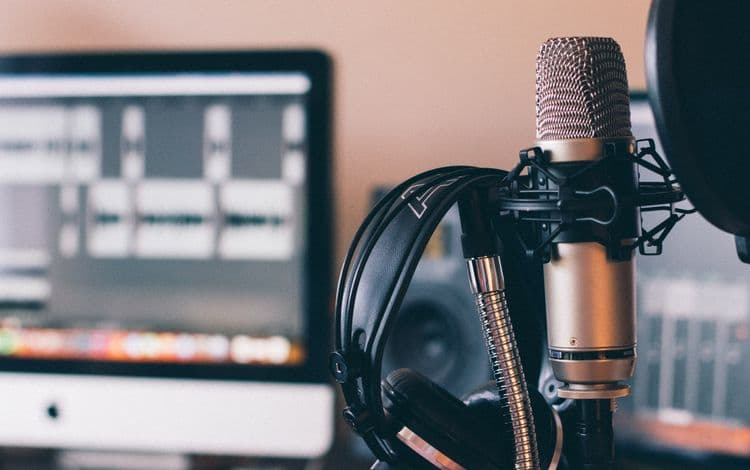Listening to a podcast have become a fairly common way for many people to pass the time: on their way to work, getting ready in the morning, during their lunch breaks. Podcasts range from entertaining and funny to educational and inspiring. That said, should your business be jumping on the podcast bandwagon? Today it is predicted that there are roughly 750k podcasts. Creating a podcast for your company might be a smart move and gain you more exposure.
By devising a podcast you are in essence positioning yourself as an authority—people love to listen to those with expertise on subjects relevant to them. You then can promote your products, extend your audience reach, and build a buzz around your brand. So what is entailed in creating a business-related podcast? What are some of the basics you need to be aware of before beginning your podcast journey?
A few podcast basics
A podcast is an audio show that people access online. Much like a television show it generally is comprised of episodes. Users download the episodes as you launch them—the great thing being that they can tune in from literally any device. Below are the basics involved in creating your very first podcast…
Identify a relevant niche
So what will the focus of your podcast be? You of course want it to relate to your business, but you also don't want it to be so specific that the audience at large is turned off. Keep in mind, you will be doing several episodes, so again make sure the niche is broad enough where it can accommodate multiple episodes.
Pick a name
What works here in terms of podcast names? You might use a name that explains what the overall content will be about. You could also think of something outside the box—something clever that people might not be expecting. That might get them to tune in! In the end, you want it to come to be recognizable with your brand. Rule of thumb: for the most part, try not to use your company name in the title of the podcast.
You have to choose a format
There are a variety of ways to go here. Some podcasts are hosted by a solo person; some podcasts are co-hosted by two or more people. And then still, others focus exclusively on an interview format where the host/co-hosts speak with a new guest on every episode. The key is to think about what best would suit your particular subject/field. And you always want to make sure that the message gets out there and impacts the listening audience.
Decide on the length
How much do you have to say about a chosen topic? This ultimately will determine how long the podcast lasts. And each episode doesn't necessarily have to be the same length. Some weeks you may have more to say than others—some topics may demand more time. They could range from 20 minutes to 60 minutes. There are also some super short podcasts (3-5 minutes/); this could very well appeal to those listeners who don't have a ton of time but do want to grab bits and pieces of information when they can.
How often will you do them
That is to say, what is the frequency of the podcasts: weekly, daily, monthly. Again, gauge what you have to say with how often you think listeners will want to tune in to hear it. You do want to have some regularity as far as the frequency of podcasts goes. This will help you grow an audience faster than if say, you only put them out there sporadically. But at the same time, you don't want to commit to something that is going to overwhelm you; you do have a business to run after all. Figure out what you can handle.
Microphones you will need
Because a podcast is an audio-based sound of course is going to be paramount, as you want the quality to be top-notch, otherwise, listeners may just get annoyed and tune out. Ideally, find a USB microphone that plugs into your computer. Using your computer's built-in mic is likely to cause you some issues.
You can easily find microphones out there for less than $100; however, depending on how "professional" you want the podcast to be you might consider investing in a higher-end mic to optimize sound quality. Also, think about your surroundings…some opt to broadcast from small carpeted rooms as this helps with the overall acoustics.
When conducting interviews
Getting into the actual content of your podcast, as mentioned, interviews are a popular format. That said, you always want to be prepared. Have a list of questions ready to go. What's more, you probably want to send the guest the questions in advance so they can begin to formulate more coherent answers. If guests are remote, think about what platforms you will use (be it Skype or Zoom/) that will get you the best results. Make sure your Wi-Fi connection is good to this end.
Also, take the initiative to get a bio on your guest before the podcast; this way you can be prepared in terms of creating smoother introductions and segues.
Music
The music that serves as the lead in and potentially the conclusion should complement the personality of your overall podcast. Avoid copyrighted music. There are free to use libraries that offer many workable options. Another option: enlist a local musician or band to write and produce the signature song that will come to be associated with your podcast.
Starting a podcast for your company could be a great way to attract and grow your followers. If you need additional funds to this end, we can certainly help. First Union Lending works with small businesses to get them the cash they need to succeed. Call today!
